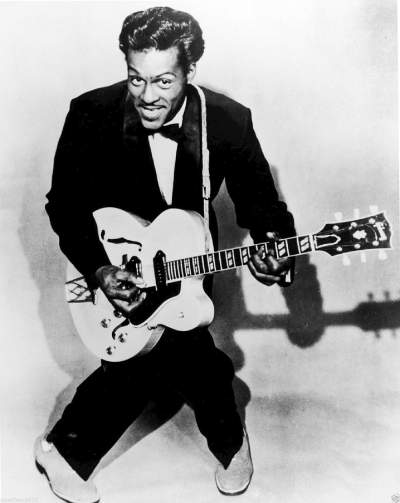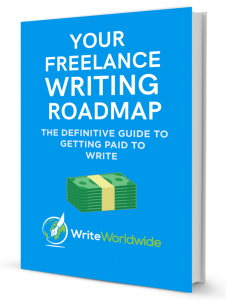Rock ‘N’ Roll legend Chuck Berry sadly died on Saturday at the age of 90. Berry was known for many things including inventing the guitar riff, keeping Angus Young in shorts for 50 years, and taking the pop culture rating of the Back to the Future film franchise from a strong 7 to a solid 10.
But is there anything to learn from Chuck Berry about how to be successful as a freelance writer?
As you may already have guessed from the title of this article, the answer is: absolutely.
Read on for two very important lessons from the one on the greatest entrepreneurs of his generation.
Lesson One: Get Your Money
One of the issues many freelance writers struggle with is also one of the most pressing: money. It can be difficult for a lot of freelancers – especially beginners with little experience – to know what to charge, or even feel okay about asking to get paid for your work at all.
Pricing yourself too high is often a source of fear, and even the most established freelancers can suddenly become timid when it comes to chasing up those invoices.
But the next time you feel daunted about raising your rates or following up on payment with that tricky client yet again, take comfort in this: Chuck Berry had the same problems.
After some unpleasant experiences early on in his career, Berry noticed a pattern: a lot of promoters didn’t take him seriously, and would short change him his fee. He frequently heard the phrase ‘the cheque’s in the mail’ when it wasn’t, and money transfers promised to him never showed up.
This lead Chuck to establish a hard and fast rule that he would eventually become famous for in his area of business: before taking the stage to play even one note of music, he must be paid, in cash, the full amount.
No money? No show.
Think about that. Not only does it mean you’ll never chase money again, it’s a very powerful stance to take psychologically: you’re showing supreme confidence in your worth and your abilities by setting payment terms that put you in the strongest possible position financially.
It also clears the decks, because receiving all the money upfront gets rid of any awkward future conversations about payment, and leaves you more able to concentrate on doing the best job you’re able to do.
It’s a frame of mind I’ve personally adopted; my own services list states that all agreed-upon fees must be paid in full upfront (although payment schedules are generally negotiable for more complex projects like white papers, case studies, or ghostwriting books).
The point is to make sure there’s money in your hand (or bank) BEFORE you start work. I don’t worry about clients not following this rule because a) if they don’t all they’ll get in return is a blank page, and b) it means they don’t really respect my time or my skills, and I’d rather work with clients that do. There are plenty out there!
Lesson Two: Your Work Is Your Reputation….
As a freelance writer, you can do everything right – market yourself effectively, network with the right people, have a top-notch website and price your services competitively – but in the end your success will depend on the quality of your work.
Chuck Berry knew this too, which is why whenever he got hired, his work was literally the only thing he provided. He didn’t even tour with a regular backing band, instead getting promoters to hire local musicians to play with him at every show.
Sometimes he would even forego staying in a hotel, and get to and from a gig in the same day. Promotors paid for Chuck Berry in concert, and got exactly that, and it was still brilliant. Most of the time, anyway…
….and Vice Versa
There’s one famous story of him having been paid and under contract to play two shows, yet leaving the venue after the first one – with his full fee in the trunk of his car.
When recalling the incident recently on learning of his death, the promoter admitted that while Chuck Berry could have a reputation for being demanding – and on that particular occasion, very difficult to work with – he would still remember him as amazing and influential.
So what can you learn from this as a freelance writer? There are a couple of useful take-aways.
1) Always get paid.
2) Always make sure that you fulfil your contract.
3) No matter how frustrating a job may turn out to be, try not to do a runner to the airport with your client’s money stuffed in a suitcase.
You can certainly set your own terms, and perhaps even have something of a reputation, but if you do great work, the clients will keep coming back and you’ll soon be known as one of the best in the business.
Have icons in other areas of creativity inspired you on your freelance writing journey? Leave a comment and let us know.
Are you looking for more helpful articles like this?
Visit our "Start Here" Page to find content that appeals to you, wherever you are in your writing journey



